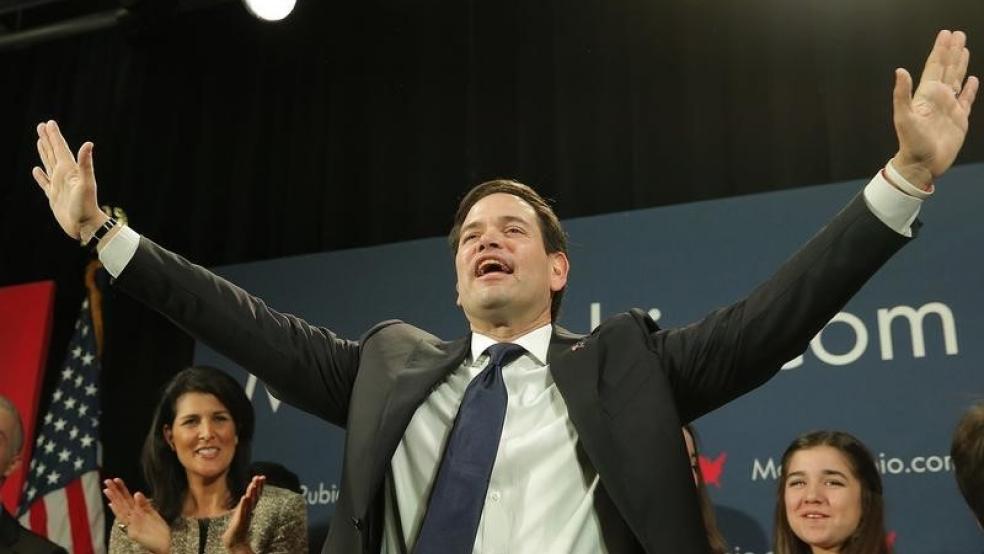Heading into tomorrow’s Republican primary in Nevada, there weren’t a lot of high-profile endorsements available to the candidates left in the race. The one that was still outstanding – Republican Sen. Dean Heller’s – went to Marco Rubio of Florida on Sunday afternoon, strengthening the first-term senator’s claim to be the consensus candidate of the Republican establishment.
Declaring Rubio the candidate of the GOP establishment is surprising because Marco Rubio’s record in Washington, limited though it is, definitely isn’t something that lands him in the Republican mainstream. He has a 98 percent lifetime rating from the American Conservative Union in the most recent legislative year tracked by the ACU (2014), and a 94 percent rating from the Heritage Foundation. Both of those scores place Rubio not in the mainstream of the Senate GOP, but among its most conservative members.
Ted Cruz has a 100 percent rating from ACU; Trump, Carson and Kasich lack ratings at this time.
Related: Rubio Now Emerges As the Man Who Top Donors Tag to Beat Trump
In Nevada, Heller was the only nationally known statewide elected figure who was willing to back a GOP candidate. The senior senator from Nevada, Democrat Harry Reid, obviously wasn’t going to be endorsing a Republican. And the state’s governor, Brian Sandoval, made it clear late last year that he wouldn’t be endorsing anyone at all. (Though he did indicate that if he were planning to endorse, his candidate would absolutely not be GOP frontrunner Donald Trump.)
Heller’s endorsement of Rubio followed the Florida senator’s success in securing the backing of three key South Carolina political figures in advance of Saturday night’s primary: Gov. Nikki Haley, Sen. Tim Scott, and Rep. Trey Gowdy. While it’s always hard to gauge the effect of an endorsement, Rubio enjoyed a notable bump in the polls after Haley put her weight behind him, and he wound up finishing slightly ahead of Texas Sen. Ted Cruz who, until days before the vote, had been expected to challenge Trump in the Palmetto State.
It seems unlikely that securing Heller’s nod will do Rubio much good in Nevada. The state is thinly polled, but the few surveys that have been taken there show Trump with an enormous lead averaging more than 20 percentage points.
However, the trend of top Republicans in early states migrating toward a Rubio endorsement could create some important momentum for the senator heading into next week’s Super Tuesday elections.
Related: Rubio sharpens attacks after latest Trump win in White House race
March 1 is generally seen as a key milestone for Cruz. Having purposefully targeted his campaign at white evangelical Christians, Super Tuesday is his best shot at amassing a large collection of delegates in the early weeks of the primary. Most of the states in the Deep South, supposedly fertile ground for Cruz, vote on that day.
But Cruz failed to win even the white Evangelical vote in South Carolina, calling into question his ability to compete in the other states demographically similar Southern states.
It should also be noted that Cruz has failed to win a single endorsement from a fellow US senator. He is, by all accounts, almost universally disliked by his colleagues, which adds just one more stumbling block to his candidacy as the primary moves on.
If Cruz seriously underperforms next week, there is good reason to think that his campaign will run out of steam very quickly. And if Rubio can continue to outperform, and continue with his unlikely but very real domination of the establishment endorsement primary (see the tally kept by FiveThirtyEight.com here,) the GOP primary could be a two-man race by the first week of March.





